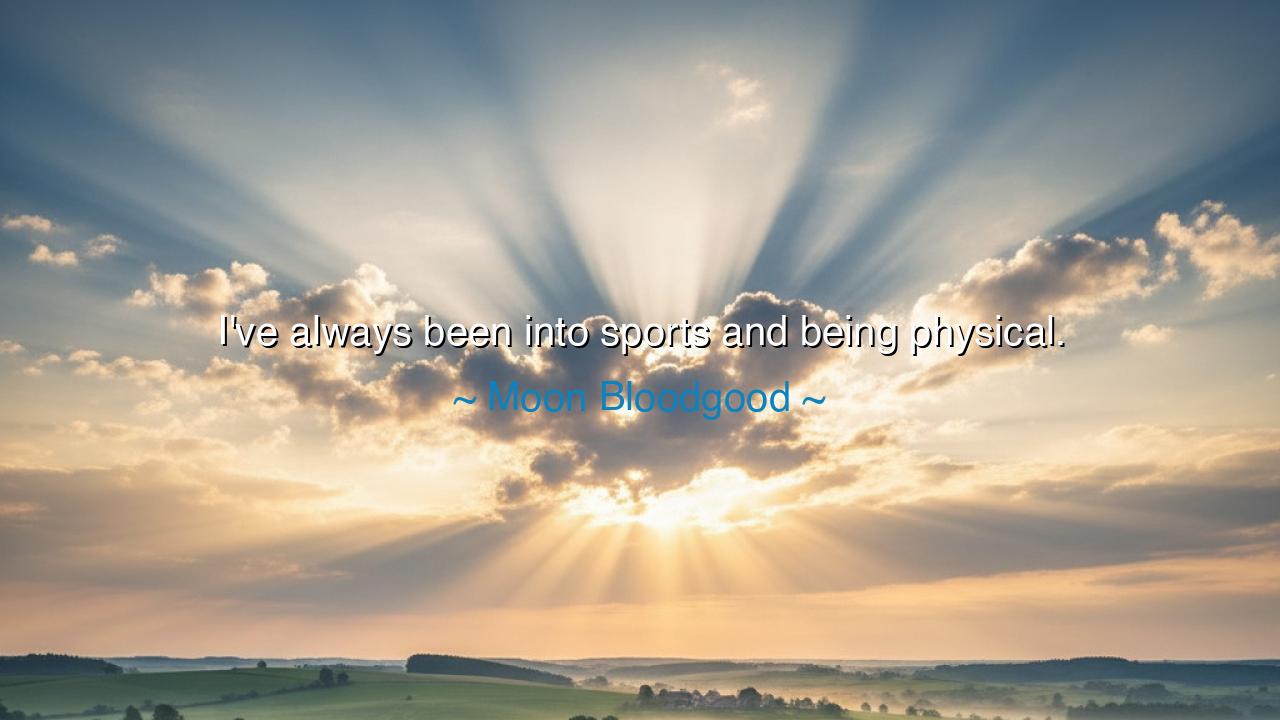
I've always been into sports and being physical.






"I've always been into sports and being physical." These words from Moon Bloodgood resonate with a timeless truth: that the body is not merely a vessel for the mind but a powerful tool in its own right, capable of strength, expression, and purpose. To be "into sports" and "being physical" is to embrace the ancient understanding that the body, in its movement and vitality, reflects the spirit. It is not a mere pastime or distraction; it is an essential part of the human experience, one that nourishes the soul as much as it strengthens the body. Through sports, through physicality, we engage with life itself, testing our limits, learning the value of discipline, and embodying the lessons that shape us.
In the ancient world, the relationship between the body and the spirit was sacred. The Greeks, in particular, celebrated physical prowess as a pathway to moral and intellectual excellence. The Olympic Games, which began in 776 BCE, were not just competitions of physical strength but sacred rituals that honored the gods. Athletes trained for years, enduring great sacrifices and pushing their bodies to the edge in the pursuit of greatness. Yet, it was not merely the victory that mattered—it was the discipline, the commitment, and the wisdom they gained through their struggles. Moon Bloodgood's declaration mirrors this ancient reverence for sports and physicality—it is a reminder that the body’s capabilities are deeply entwined with the spiritual and mental strength we cultivate.
Consider the legendary figure of Heracles, or Hercules, whose twelve labors tested his physical strength, but also his will and moral integrity. Each labor, from slaying the Nemean lion to capturing the golden hind of Artemis, was a testament not only to his bravery but to the transformative power of physical challenges. Hercules’ feats were not only about the triumph of strength, but about the inner growth and maturity that comes from pushing oneself beyond the limits of comfort. Similarly, Moon Bloodgood’s connection to sports and physical activity echoes this ancient pursuit: the act of being physical is about more than the movement of the body—it is about the evolution of self through strength, struggle, and perseverance.
The Romans, too, understood the value of physical prowess in shaping both the individual and society. The gladiators, though often forced to fight for their lives, were revered for their skill, courage, and discipline. These warriors demonstrated that true strength was not just physical but was a reflection of one’s character and resolve. It was in the arena, in the heat of battle, that they discovered their greatest potential—both as athletes and as individuals. The gladiatorial contests, like the sports that Moon Bloodgood speaks of, were not simply displays of violence but demonstrations of human endurance, bravery, and the spirit to rise above hardship.
In more recent history, we find the same principles echoed in the lives of athletes who embodied the timeless virtues of physical and mental strength. Consider the life of Muhammad Ali, one of the greatest boxers of all time. Ali was not just a champion in the ring; he was a man who pushed his body to the limits, testing the boundaries of his endurance and mental resilience. His training regimen, which was grueling and unrelenting, was as much a journey of self-discovery as it was about preparing for competition. He understood, as Moon Bloodgood does, that physical excellence is not just about the body—it is about the mind and the soul working together in pursuit of greatness.
The lesson here is clear: being physical is not a trivial pursuit, nor is it simply about personal health or fitness. It is about engaging with life at its deepest level—pushing your limits, confronting your weaknesses, and growing through the struggle. Whether through sports, physical labor, or simply striving to be more active in your daily life, there is a profound truth in the act of embracing physicality. Moon Bloodgood’s passion for sports serves as a reminder that discipline and strength are not just qualities we develop in our bodies, but qualities that shape our character and spirit.
In practical terms, we must engage with our bodies, not as objects of vanity, but as tools of empowerment. Incorporating exercise, sports, or physical activity into our lives is an act of both self-care and self-improvement. But more importantly, it is a way of honoring the interconnection between mind, body, and soul. Just as the ancient Greeks and Romans saw physical activity as a way to develop virtue and excellence, so too should we. To be physical is to be alive, to embrace life’s challenges with both strength and grace, and to rise to meet the challenges that come with being human. Embrace the sweat, the struggle, and the joy of movement, for in doing so, you connect with a tradition of strength that spans the ages.






AAdministratorAdministrator
Welcome, honored guests. Please leave a comment, we will respond soon